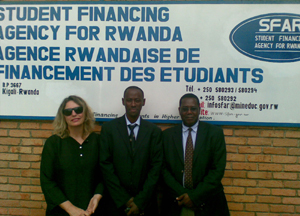Law faculty recruits students in Rwanda
07 December 2009 Long arm of the law: (From left) Assoc Prof Elrena van der Spuy, Emmanuel Muvunyi (SFAR) and Prof Evance Kalula in Kigali, Rwanda.
Long arm of the law: (From left) Assoc Prof Elrena van der Spuy, Emmanuel Muvunyi (SFAR) and Prof Evance Kalula in Kigali, Rwanda.
The deputy deans who hold the postgraduate studies and internationalisation portfolios in the Faculty of Law travelled to Kigali recently to meet with prospective students.
Earlier this year an exchange agreement between the Ministries of Education of the governments of South Africa and Rwanda paved the way for a group of 19 students to register for the LLM programme in the faculty.
The recent visit aimed at consolidating the exchange agreement, streamlining administrative processes and administering language proficiency tests to a second round of prospective students. The UCT delegation was hosted by the director of SFAR, Emmanuel Muvunyi.
During their brief visit Professor Evance Kalula and Associate Professor Elrena van der Spuy also attended the opening session of the Judicial Open Week, at which issues relating to justice sector reform in Rwanda were discussed.
The Honourable Chief Justice spoke about far-reaching institutional reforms involving the modernisation of infrastructure, and the development of technological skills and human resource capacity within the justice sector.
The discussions also touched on the challenges confronting the reform of the judicial sector in post-conflict jurisdictions. The delegation paid a brief courtesy call to the Minister of Education. A visit to the Genocide Memorial Museum brought the visit to a fitting conclusion.
"Fifteen years after the blood events of 1994, life in Kigali seems to have transformed itself," Van der Spuy said. "The city is situated on rolling green hills. The vegetation is lush. The streets are clean. More importantly, public perception reflects an absence of concerns about public safety - in sharp contrast to South Africa."
Among the students there was eagerness to explore the possibilities of exchange, she added.
"As a potential host institution, UCT also stands to benefit from the presence of a cadre of motivated postgraduate students who will bring their comparative experiences to bear on wider African conversations about law, justice and democratisation."
 This work is licensed under a Creative Commons Attribution-NoDerivatives 4.0 International License.
This work is licensed under a Creative Commons Attribution-NoDerivatives 4.0 International License.
Please view the republishing articles page for more information.










